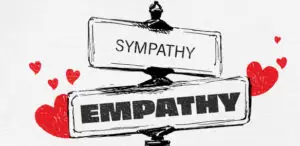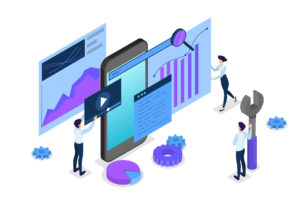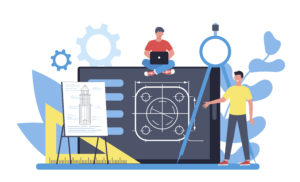 Relationships are key in our human experience, and showing support is crucial in maintaining positive relationships. We all want to feel understood and heard. As a leader, it’s important to model empathy and create a culture that embraces empathy. Empathy is putting yourself in someone else’s shoes to become more aware of their thoughts and feelings.
Relationships are key in our human experience, and showing support is crucial in maintaining positive relationships. We all want to feel understood and heard. As a leader, it’s important to model empathy and create a culture that embraces empathy. Empathy is putting yourself in someone else’s shoes to become more aware of their thoughts and feelings.
Empathy & Sympathy: What’s the difference?
Remember Elmer Fudd from the classic cartoons. “That wascally wabbit!” he would say after his twentieth attempt trying to catch Bugs Bunny. Then a little angel would appear on his shoulder. A little devil would appear on the other. Both arguing their way into his next step. Empathy and sympathy are similar voices in my head when I see a team member in turmoil.
Empathy and sympathy are two sides of the same coin. When a trusted colleague shares a difficult moment, the inner argument begins. Poof, sympathy appears with red pointed horns and gently whispers in my ear, “Man, that sucks. Really it does, but you’ve been through that a million times. Give them your playbook on how you got through it. Boom, problem solved.” When someone is vulnerable enough to share the agony they’re going through, don’t go straight to solution mode. Expressing your sorrow for someone, then slapping a proverbial “happy sticker” on it only makes them feel worse.
On queue, empathy appears on the other shoulder in a stark white robe with an angelic halo. He calmly says, “Don’t judge. Don’t compare. Just listen.” Rarely does a colleague want you to solve their problem. In fact, I’ve discovered (the hard way) that people simply want to be seen, heard, and appropriately responded to in those moments.
Build Your Empathy Superpower
According to Psychology Today, “Empathy is the ability to recognize, understand, and share the thoughts and feelings of another person, animal, or fictional character. Developing empathy is crucial for establishing relationships and behaving compassionately. It involves experiencing another person’s point of view, rather than just one’s own, and enables prosocial or helping behaviors that come from within, rather than being forced.” Empathy in an emotionally vulnerable moment can have a profound impact. Handled correctly, it builds stronger bonds that foster a new level of trust — an invaluable commodity I’ve learned to foster over the years.
Three critical actions drastically improved my ability to exercise the little voices on my shoulder in these moments. Active empathetic listening, accurately paraphrasing what I heard, and enhancing my emotional intelligence skills have helped my empathy voice develop from a whisper to my go-to advisor.
Empathy reminds me to make eye contact, use nods to show understanding, and most importantly to keep my mouth shut until my colleague has shared their entire story.
Like a zen master, empathy tells me to say something in the spirit of, “Thank you for sharing that with me. I’m here for you.” This sincere place of comfort and understanding has fostered a level of connection with my team in moments they needed most that I wouldn’t trade for the world. Not only will this effort drive better results in your business and personal relationships, you’ll truly engage a leadership superpower.




